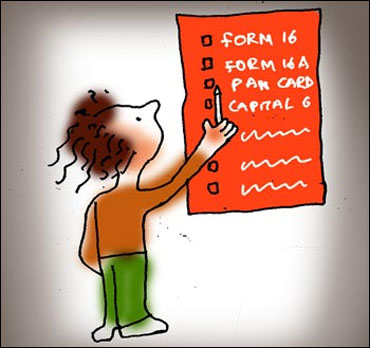 | « Back to article | Print this article |
Missed the deadline for filing tax returns? Don't panic
It is quite well-known that the deadline for filing income tax returns is July 31, yet many people miss the date for various reasons. Reasons may be genuine problems or simple laziness.
However, there is no need to panic as there are ways to salvage the situation by filing belated returns under various clauses.
Nil tax pending
This includes people who have either paid advance tax or have resorted to TDS and thus have no outstanding taxes. This is a comfortable situation.
One can fill the returns anytime by the end of the financial year without any penalty being levied. Thus for the current assessment year one can safely file returns up to March 31, 2013.
However if returns for the current assessment year is filed beyond this date then one will have to pay a penalty of Rs 5,000 which is again at the discretion of the assessing officer.
Click on NEXT for more...
Missed the deadline for filing tax returns? Don't panic
With tax pending
In the case of an individual who has certain amount of unpaid tax due to various reasons such as income from other sources or change of employer in the middle of a particular year, the return can be filed even after the deadline up to the end of the assessment year. However a penal interest of 1 per cent will be charged on the outstanding amount of unpaid tax.
For example if an individual has a net tax payable of Rs 100,000 and has paid Rs 60,000 through TDS and Rs 30,000 as advance tax then the outstanding amount is Rs 10,000.
For this outstanding amount of Rs 10,000 he will have to pay a penalty of Rs 100 which is 1 per cent of that amount for each month delayed beyond July 31.
Thus the net tax payable, if paid in October 2012, in this case will be Rs10,000 + 3 per cent of Rs 10,000 which is Rs 10,300. However if the same return is filed after March 31, 2013, say in the month of April 2013, then there will be an additional penalty of Rs 5000 making the total amount payable as Rs 10,000 + Rs5000 + 9% of Rs 10,000 which is Rs 15,900.These provisions for late filing and additional penalty clauses are detailed in section 234 of the IT Act.
Click on NEXT for more...
Missed the deadline for filing tax returns? Don't panic
Tax refund due
In this case also one can file the returns after July 31 in order to claim the amount due for refund.
However the only disadvantage in such a situation is that the refund claim will be processed late and thus the actual receipt of the refund amount may take considerable time.
Click on NEXT for more...
Missed the deadline for filing tax returns? Don't panic
Losses to be carried forward
For individuals who have incurred losses in the current assessment year and wish to carry forward the same for exemption in the subsequent years, not filing returns by the deadline of July 31 has the biggest disadvantage.
Irrespective of the fact whether you have outstanding taxes due or not, in case the return is not filed on time then the losses incurred in this year cannot be shown for offsetting income to get exemption in the next year.
For such individuals it becomes mandatory to complete the process of tax filing before the deadline to take advantage of tax benefits in the subsequent years.
The only exception in this clause is losses incurred on housing property where one can carry forward the losses even if the return is not filed before July 31.
Click on NEXT for more...
Missed the deadline for filing tax returns? Don't panic
Common disadvantages
Irrespective of the category that one falls there are, however, a few disadvantages that one will have to bear in case the returns are not filed before the deadline. The first of these problems is that there is no provision to revise. This implies that the individual can no longer file a revised return for that assessment year.
The other disadvantage is that certain exemptions under Section 80 are not available to assessees who file their tax returns after the deadline.
Filing tax returns have been made extremely simple and easy in the past few years. The wonderful provision of online filing is also available to all individual assesses. Thus one must endeavor to file the returns before the deadline to avoid missing out on exemptions being given by the IT department.
Powered by
BankBazaar.com is an online marketplace where you can instantly get loan rate quotes, compare and apply online for your personal loan, home loan and credit card needs from India's leading banks and NBFCs.
Copyright 2024 www.BankBazaar.com. All rights reserved.




